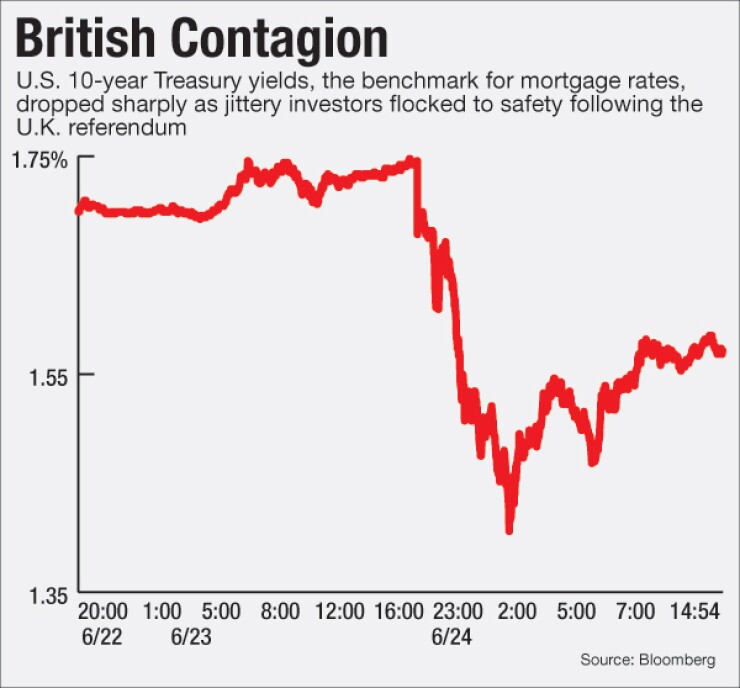The market gyrations following the United Kingdom's vote to leave the European Union have an upside for mortgage lenders, as already-falling interest rates are expected to boost home purchases and refinancing.
United Wholesale Mortgage distributed a rate sheet to brokers Friday with pricing that was 60 to 80 basis points lower than Thursday's rates, said Mat Ishbia, president and CEO of the Troy, Mich., lender. Mortgage brokers are taking advantage of the opportunity to lock in rates on applications already in their pipelines. There has been no appreciable change in the mix between purchase and refinancing loans, Ishbia said, with refis accounting for just over 50% of volume.
The drop in rates comes as investors flee to the safety of the 10-year Treasury note that serves as the benchmark for mortgage interest rates, creating a "Brexit benefit" for lenders and borrowers, said Mark Fleming, chief economist of First American Financial. The yield on 10-year Treasury notes fell more than 30 basis points Friday morning, before recovering roughly half of that drop-off by midday.

"It should spur further purchase demand and strengthen the opportunity for first-time homebuyers to be able to get in," he said. "First-time homebuyers are busy trying to snap up what little inventory they can find right now in the housing market and this only helps."
Ishbia expects rates to remain low and both purchase and refi application volume to pick up. But the situation might end up frustrating real estate agents because of a lack of back-office capacity to process the additional business.
"People can't close loans as fast. They're going to have to find lenders that can close loans efficiently and fast and not take 60 or 90 days to complete a purchase," Ishbia said.
Mortgage rates were already
"I don't know that refis are going to come roaring back. We've done that," he said, referring to runoff in the pool of potential refi prospects. Still, "we could be back to a 3% mortgage."
And there might be some uptick in purchase activity, but rates have been low for so long that many people who are seeking a new mortgage already have been in the market, Whalen said.
Over the long term, rates will be affected as people put money into less risky investments because they just don't have a clue about what will happen, he said. It could take as long as two years before the United Kingdom is out of the European Union.
"With events like this, this is just total uncertainty. We don't know. Do we know how this is going to impact banks and everything else over the next five years? We just know that it will," Whalen said.
"I think all of the question marks are going to keep a downward bias on rates, at least for the rest of this year," he added.
Uncertainty could also limit the extent that purchase mortgage volume benefits from lower rates.
"Any pickup on the purchase side via lower interest rates will be washed out by a lack of confidence. I don't think it will have a net impact on purchase," said Brian Koss, executive vice president of Mortgage Network, a lender based in Danvers, Mass.
The number of potential refinance candidates grows tremendously with every 12.5-basis-point drop in interest rates, Koss said. But mortgage rates are likely to be volatile for some time. "Three or four rate moves a day will be more commonplace until things settle down," Koss said.
Still, homebuyers stand to benefit from both increased affordability due to low rates and decreased competition from foreign investors for real estate inventory.
"We've seen this play out in a sense over the past year, when the Chinese stock market collapsed in August. That caused a lot of global instability," said Daren Blomquist, a senior vice president at RealtyTrac. "We've seen evidence of less foreign investment in U.S. real estate and that is putting less upward pressure on home prices, especially in some of these high-priced markets."
Residents of the U.K. represent the second-largest base of foreign subscribers to RealtyTrac's real estate data platform, trailing only Canada and ahead of China.
"Capital from the United Kingdom has been flowing in and has been a big part of the U.S. housing recovery over the past few years," he said. "That is why they will have an impact as they withdraw from the market."
But Blomquist expects the Brexit vote will stem the flow of U.K. investment in domestic real estate, easing pressure on home prices, particularly in cities like San Francisco, New York and Seattle that are "trophy" markets for foreigners.
"The winner here is the prospective homebuyer, who has been locked out of the market," due to foreign competition, he said, adding that sellers may be the loser, as they are no longer in driver's seat as demand weakens.
However, the mortgage and real estate sectors are not immune to the broader implications of the Brexit vote.
"We get a financial benefit, but there is real economic downside risk here," said Fleming. The British pound has weakened significantly compared to the U.S. dollar in the hours after the vote, making exports to the U.K. more expensive. That weakness could go on for some period of time. That could take a toll on job growth in the U.S., as companies that export to the U.K. cut back on production and employment, he said.




